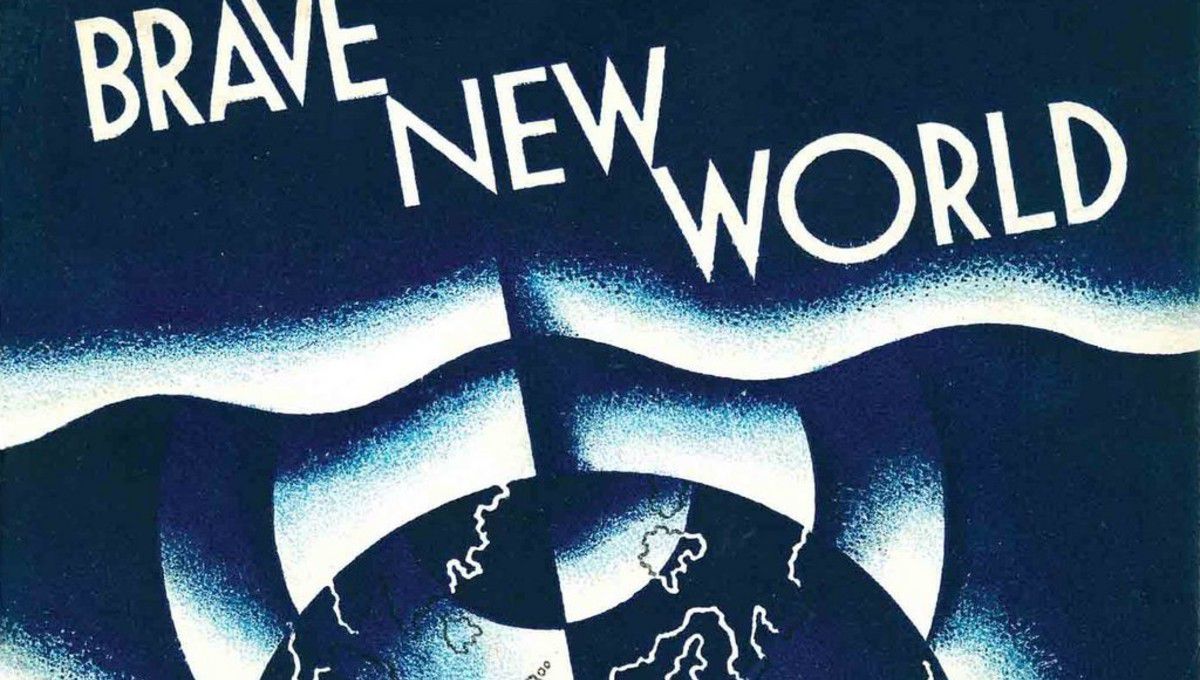Towards a New Techno-Optimism

Civilization is an iconic video game series created by Sid Meier where you take control of one of the great civilizations across history and manage its growth from a Bronze-Age agricultural settlement to a vast nuke-wielding, internet-surfing empire. As can be guessed from the description, a large part of the game involves the research of different technologies, where some technologies bring you to a new age (e.g., from the Bronze to the Classical Age). Each technology has its own set of prerequisite technologies, and you have freedom to choose which technologies to prioritize.
I bring up Civilization not only because its fifth installment is one of my favorite games of all time, but also because it highlights an oftentimes inconvenient truth about human civilization: humanity doesn't change. We can fight with spears and horses or with anti-aircraft guns and tanks, but the human struggle to be at peace and continue living is as old as sentience itself. They say that the advent of nuclear weapons is what gave us the power to destroy ourselves, but we've always had that power, just at a smaller scale.
What then is the role of technology in our lives? Every once in a while, a new innovation keeps us preoccupied with fantasies of all that can be. Container shipping made the transport of goods around the world considerably cheaper, and refrigeration ensures that we can get fresh produce from almost anywhere. The Internet has brought power to the people like no other technology, and has enabled mass communication on a never-before-seen scale. And don't get me started about AI and how it has captured the imagination of technologists worldwide. (Don't worry, this is not another AI-related post.)
Something most of us can agree on is that technology makes our lives better. Scientists expand humanity's frontier of knowledge, while engineers figure out what kind of problems people face and provide reasonable solutions. Objectively, when looking at the variety of all that we can do and consume, it wouldn't be a stretch to say that we're living in an age of material prosperity compared to even how royalty used to live a millennium ago. Access to goods from around the world, the ability to contact anyone at any time, medicine that actually works, an unparalleled access to knowledge and information, sanitary environments for all daily activities, and I can go on. No amount of wealth from a thousand years ago can buy what we have now, and all things considered, I'm glad to live in 2024.
However, a growing chorus of people claim that technology has not made our lives better and will never do (the techno-pessimist position), and perhaps as many people claim that technology will solve every problem humanity faces (the techno-optimist position). While I lean more toward the latter, even a cursory glance of the titles of my posts reveals that it's not so simple. In this post, I'll be examining techno-optimism specifically and justify my tempered passion for technological progress in general.
The Techno-Optimist Manifesto
It's difficult to discuss techno-optimism without discussing the Techno-Optimist Manifesto by Marc Andreessen, co-founder of Netscape and venture capital firm Andreessen Horowitz. It caused a stir online and even on-print, and people both practical and ideological have their own issues with it. Many feel that it's too simplistic, and doesn't address, or even mention, many of the problems that have arisen as a result of technology. This critique is a good thing; human skepticism is one of the driving forces behind technology, and it's ironically appropriate for the same skepticism to be directed towards techno-optimism.
While I've heard about it and have read excerpts from it, I'd never actually read the whole thing in full until I started writing this post. I have to say that I do agree with an overwhelming majority of what was being said. On a line-by-line basis, it's difficult for me to disagree with statements extolling the benefits of deregulation and free markets, while simultaneously criticizing the Luddite approach to nuclear energy and other technologies that could have otherwise helped humanity. However, there are a few points that I disagree on.
Love at Scale
In Andreessen's argument for free markets, he provides an explanation as to why money is the ultimate incentive in driving the economy:
David Friedman points out that people only do things for other people for three reasons – love, money, or force. Love doesn’t scale, so the economy can only run on money or force. The force experiment has been run and found wanting. Let’s stick with money.
I agree that the force experiment has had lackluster results: Hayek's The Road to Serfdom is an essential read in explaining all the ways central planning doesn't work. Money is also an incredibly effective incentive, and it's the only one that allows humans across the world who do not know about each other to collaborate on increasingly complex creations. For example, a smartphone requires the collaboration of thousands of individuals across countries, societies, and classes, and money as an item of value and medium of exchange allows for collaboration the likes of which has never been seen before in human history.
However, I take issue with the point that "Love doesn't scale". Love absolutely does scale. It's, in fact, the blind adherence to passion that has resulted in some of the great (and sometimes terrible) outcomes of the past. Nationalism is love scaled up to the country. Tribalism is also love at scale, and ideologies across the spectrum consider community and civil society to be important, going beyond just the individual. Extended families and kinship groups had been the foundation of support systems for most of human history.
Andreessen's approach to techno-optimism supports the false dichotomy of the individual and the universe. The reality is that the family and the community add a cultural dimension to the scale of universal concerns, and unbridled technological progress oftentimes looks over such matters. It's in our own interest to renew and strengthen the covenant that fills in the gaps between the individual and the universe, and this cultural shift is essential for techno-optimism to be wholly valid. Technological progress should be motivated by love as well; technology should focus on bringing peoples and communities together.

Abundance & Ephemeralization
As a software engineer and a graduate student in Computer Science, optimization is perhaps the most important aspect of what I do on a day-to-day basis. Most problems, in fact, have trivial solutions that are nonsensically inefficient. For example, you can technically sort a deck of cards by shuffling it, but you'll probably be stuck doing that for billions of years. The manifesto mentioned Buckminster Fuller's "ephemeralization", or the idea that technological advancement gives us the ability to do "more and more with less and less until eventually you can do everything with nothing", and this is the justification for the following:
We believe technological progress therefore leads to material abundance for everyone.
True! It is impossible to deny that material abundance and access to complex products from around the world is something that has only been made possible due to technology, and that it's increasing efficiency in production and distribution that has caused this. (Consider the innovations of refrigeration and container shipping when it comes to freight.) But why is that material abundance doesn't result in an abundance of joy? Why is it that, no matter what magic we experience, we get used to it and take it for granted soon after, or reject it completely?
The role of happiness in human development is an interesting one that doesn't have any good answers, but it's clear that people are not happy in spite of material abundance. This means that there is something more that is not improving with technology, something built-in to the human programming that transcends aeons and cultures. There's something that is difficult to optimize, difficult to create out of nothing, and yet essential for our happiness. Perhaps optimization defeats the point.

Aldous Huxley's Brave New World deals with the incompleteness of life in the face of abundance. In Brave New World, we are introduced to a dystopian world where humans themselves are mass-produced, and it seems that the goal is to make the population as artificially happy as possible: every material need is provided, and in times of frustration, a drug known as soma induces happiness yet again. In this society, humans who have rejected all the pleasures of contemporary life are viewed as oddities. A few characters realize that, in spite of everything, they are still not as happy as they should be. It's a perfectly optimized civilization, and yet there are some things that are missing.
Technology is the quintessential human pursuit, and it's the one we need to harness to spread through the cosmos and future-proof ourselves against the sun turning into a red giant and ending life on earth. That being said, it is not the only human pursuit. Being burdened by choice, whether when deciding what to eat for lunch or when making major life changes, is a strange quirk. It seems like, at an individual level, there is always something greater to pledge ourselves to to take these choices away. This quasi-asceticism is a circle techno-optimism cannot square. Not everything can, and should, be optimized.
A New Techno-Optimism
Don't get me wrong, I am a techno-optimist at heart. A lot of people nowadays would say that they're not, but at the same time, you would be hard-pressed to find someone who genuinely wants to return to ancient civilization. I think it's easy to take for granted the twin forces of technological progress and economic liberalism and how they have radically improved material conditions for most of the world. However, we are still not able to predict the future; none of us would be techno-optimists if Arkhipov had decided to launch the nuclear warheads in the Cuban Missile Crisis. The manifesto is a great starting point in covering the basic tenets of techno-optimism, but it's incomplete. A new critical techno-optimism is necessary, one that integrates the arts and considers the gap between the individual and the universe.
We need to ask the right questions, the hard questions, and come up with answers that are impossible to fully agree on. A game of Civilization lasts a few hundred turns before it ends. We still have an infinite number of turns to go; more than enough time to progress in more ways than one.




